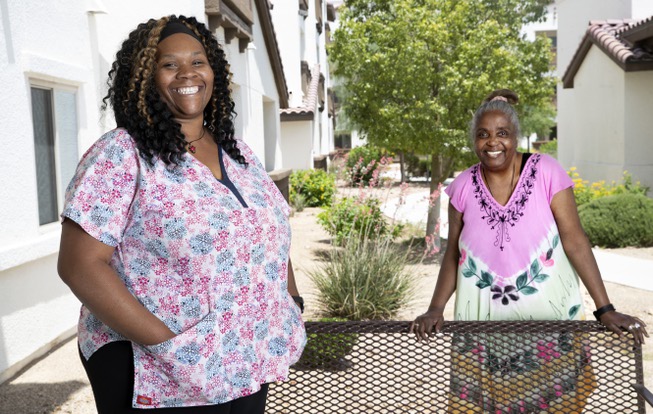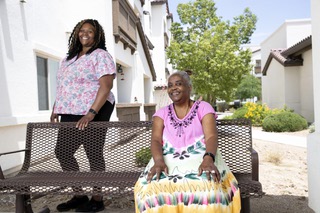
Personal care assistant Chrystal Taylor, left, poses with her client Gwendolyn Thomas outside Thomas’ apartment Thursday, June 8, 2023. Senate Bill 511, signed by Governor Joe Lombardo, will help home care workers by increasing their minimum wage from $11 to $16.
Sunday, June 11, 2023 | 2 a.m.
Related Coverage
When Chrystal Taylor left her job in early childhood education over a year ago to become a home care worker, she knew a pay downgrade was inevitable.
What she didn’t expect was having to choose between paying her electricity bill or getting food for her family each month.
The single mother lives with her own mom and three kids, all between the ages of 10 and 22 years old, two of whom are autistic. Taylor, 44, supports them all with a job in which she works about 27 hours a week and earns about $11 an hour.
“It’s a struggle trying to determine from paycheck to paycheck which bills are going to get paid, which one I have to wait on because I don’t have enough to pay what needs to get paid when it needs to get paid, based off of the amount that I get,” Taylor said. “We’re not treated properly for what they’re expecting us to do for other people.”
But with Gov. Joe Lombardo and the Nevada Legislature agreeing on a state budget last week, that’s about to change. Tucked into the legislation for Nevada’s estimated 13,000 home care workers is a minimum wage increase from around $11 to $16 an hour.
It’s the first raise in over a decade, according to officials with SEIU Local 1107, the union that represents home care, health care and public service workers in Nevada.
Compassionate care providers
Home care workers, also known as home health and personal care aides, assist senior citizens and people with disabilities or chronic illnesses that need daily assistance, according to the U.S. Bureau of Labor Statistics.
They’re usually required to have at least a high school diploma, put in about eight hours of training and gain certifications in areas like CPR or first aid.
Taylor takes care of her two clients, women in their 80s and 90s who live alone, for 27 hours a week. She said she’d like to take on more clients, but her own health limits the type of people she can serve.
“I started to have anxiety attacks, so I wish I was able to take on any person, but I can’t, so that also puts a damper on the service and the care to these clients,” Taylor said.
A typical day for Taylor includes cooking for her clients, doing common household chores, bathing them, helping them go to the bathroom and dressing them.
Sometimes she has to drive and get groceries or medication for her clients in addition to all of the traveling she does for her own kids’ medical appointments, which Taylor said has caused “wear and tear” on her car.
One of Taylor’s clients also has impaired vision, so she has become responsible for organizing the 91-year-old’s medications and ensuring they’re all in the right doses.
“Home care workers have some of the most important jobs in the world — providing compassionate care for so many Nevadans — but their essential work is also some of the most underpaid,” said State Sen. Rochelle Nguyen, D-Las Vegas, who chairs the Senate Committee on Finance Subcommittee on Human Services and was an advocate for the wage increase.
In 2021, Nevada’s home health and personal care aides earned $11.28 an hour, according to PHI, a company that specializes in research on the direct care workforce.
The Guinn Center found in 2020 that nearly 84% of the 13,000 home health care workforce were women, and despite accounting for only 34% of Nevada’s population, around 44% of home health workers are people of color.
About 20% of these aides are uninsured, surpassing Nevada’s overall uninsured rate of 14%, according to the Guinn Center.
This lack of pay has also led to a flight of home care workers as Nevada deals with the “Silver Tsunami,” a metaphor used to describe an older population that outnumbers younger ones.
Elderly population growing
About 15% of Nevada’s population is 65 years old or over, and 14% of Clark County residents are senior citizens, according to the Aging and Disability Services Division’s annual Elders Count Nevada 2023 report.
This is expected to grow through 2030 as Nevada’s population inches closer to the projected 3.5 million residents by 2032.
Urban areas of Southern Nevada have become a popular spot for older adults to migrate because of an availability of health care and transportation resources, the report said.
“The continued growth of the age 55 to 64 (group) continues to increase and will impact available resources (in Nevada),” experts said in the report. “This also continues to exacerbate Nevada’s population imbalance, where currently 73% of Nevada’s population resides in Clark County.”
As a result of an aging population, PHI reported that 8.2 million direct care jobs will need to be filled from 2018 to 2028, including home care workers. About 6.9 million of those existing jobs will become vacant as more people leave the field or labor force.
This will exacerbate the state’s “crisis-level workforce shortage” driven by “poverty pay, a lack of basic benefits, the lingering impact of the pandemic, persistent inflation and rising compensation in other industries,” said a union representative.
Taylor said she has been at her company for little over a year, but already she has heard stories of people leaving the industry due to low wages and little support.
She added that the work home health care workers do — which can sometimes involve lifting clients or learning how to navigate mobility devices — can be physically and mentally taxing for these aides.
The pay makes Taylor and many other home care workers feel underappreciated, she said.
Workers in state organized
Senate Bill 511 was one of five major state budget bills that hit Lombardo’s desk this year. The bill, which he signed into law on Monday, increases the Medicaid reimbursement rate for home health workers to no less than $16 to $25 an hour.
Most home care aides are employed through private agencies funded by Medicaid, so that reimbursement rate provides the funding these companies use to pay their workers, said a union representative.
The fight for a wage increase began in 2020 when Nevada home care workers began organizing throughout the state, a union representative said. They successfully advocated at the 2021 legislative session for the establishment of a first-in-the-nation Home Care Employment Standards Board, which then passed a set of policy recommendations that included minimum wage and funding increases.
This year, the home care workers union fought in support of making those board recommendations part of the state budget.
And the new minimum wage raise that will go into effect Jan. 1 will be “a major thing” in helping support and retain home care workers, said Taylor.
“We try to go above and beyond (for our clients), but in order for us to be able to be there for them, we have to also be able to take care of our own house,” Taylor said. “The amount of pay that we’re getting, essentially, is not helping, so the $16 an hour is a great thing because it helps us to be there (and) there’ll be more people willing to come and stay, and be able to provide better care for the people.”

